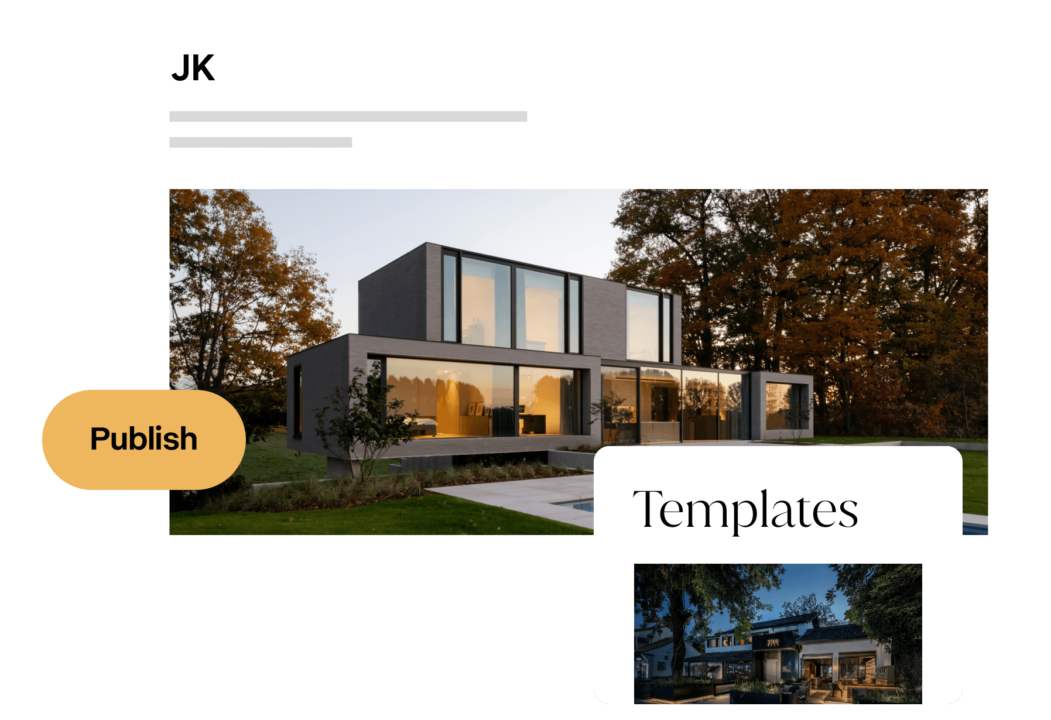As a real estate agent, the key to success isn’t working harder — it’s working smarter. And one of the smartest decisions you can make is narrowing your focus with a real estate niche.
While it might sound limiting to focus on a specific real estate niche, specializing in one defined area allows you to sharpen your focus, build your brand, craft highly effective messaging, and establish yourself as the go-to expert.
Find It Fast
What is a real estate niche?
A real estate niche is a specific market sector in which an agent or brokerage chooses to specialize. Your available niches will depend on the sector of real estate you primarily work in — residential, commercial, or property management. This article focuses on residential real estate, where niches are usually based on location, demographics, property types, client situations, and real estate goals.
Why it’s essential to develop a real estate niche
Developing a niche helps you stand out in a competitive market. In the most recent National Association of Realtors survey of real estate clients, 90% of homebuyers found their agents to be a valuable resource. This statistic underscores that clients don’t just want any agent — they want the right agent for their needs. By becoming an expert in a specific segment, you differentiate yourself from generalist agents who may lack the same depth of knowledge.
Here are a few of the additional benefits of a niche:
- More effective marketing: Your messaging will resonate better with a defined audience.
- Higher-quality leads: Clients who need your specific expertise will seek you out.
- Stronger referrals: Happy clients in your niche likely know others with similar needs.
- Higher earning potential: Expertise often commands higher commissions and premium properties.
How to choose your real estate niche
While you may not be ready to define your real estate niche in your first few years as an agent, selecting a specialty can help you gain more satisfaction from your work. As you narrow your focus, find an area that not only suits your skill set but is something you enjoy.
When choosing a real estate niche, consider the following:
- Your interests and experience: Choosing a niche that aligns with your passions and past experiences will make your work more enjoyable and help you connect authentically with clients.
- Your skill set and educational background: Leveraging your existing knowledge and certifications can give you a competitive edge and make it easier to establish credibility within a specific market segment.
- The local market and client needs: Understanding the demand in your area will help you select a niche with strong potential for growth and ensure you’re meeting the needs of buyers and sellers in your community.
- The level of competition: Some niches may be oversaturated, making it harder to stand out, while others may have untapped opportunities that allow you to position yourself as a go-to expert.
- Adaptability in a changing market: Real estate trends shift over time, so choosing a niche that allows for flexibility will help you stay relevant and continue growing your business.
- Longevity throughout your career: A sustainable niche should align with long-term industry trends and your own career goals, ensuring continued success and growth over the years.
- Profitability: While passion is important, your niche should also be financially viable, providing enough opportunities for transactions and income to support your business.
Remember, your niche can evolve over time. For example, a buyer’s agent who’s concerned about industry shifts in compensation structures might transition into working with first-time sellers, leveraging their experience while adapting to new market dynamics.
Rewrite your brand strategy
Our free resources can help you define your personal brand, level up your marketing plan, and reach your target audience.

The five most profitable real estate niche types
The most lucrative way to specialize in real estate is to craft a niche based on one of these factors: location (a particular neighborhood, city, or region), demographics (e.g. military personnel and veterans), property type (such as distressed properties or luxury homes), situation (perhaps serving people going through a divorce) and client goal (investment).
Location-based real estate niches
A natural shift for generalists, focusing on a neighborhood, town, county, or ZIP code is the most common real estate niche. Agents who concentrate on specific locations are often already set up to provide a wealth of knowledge about their hyperlocal markets.
For example, an agent in Charleston, South Carolina, needs to be an expert on historical easements, areas prone to flooding, and how hard it is to get a dock permit. A narrow location focus also allows agents to hone in on their marketing and lead generation to attract the right audience.
Demographic real estate niches
This route requires agents to focus on a specific group of people based on age, income, profession, family status, or lifestyle preferences. By catering specifically to a distinct segment, you can become a problem solver for that target population’s needs, wants, and challenges.
Carving out a demographic-based real estate niche is also an excellent way to get referrals and grow your real estate business organically. Some examples include:
- Military service members and veterans
- First-time buyers or sellers
- Seniors downsizing
- Families seeking multigenerational housing
- Employees of industries common to your area
Property-type real estate niches
Another smart route is building your real estate niche around a unique kind of property. Take, for example, a real estate agent who focuses on rentals. The National Multifamily Housing Council reports that more than 45 million households in the United States are renters. By specializing in rentals, an agent can build extensive knowledge of the local apartment market, including leasing prices and interest, and become the go-to agent for landlords.
Other types of property niches include:
- Luxury homes
- Agricultural properties (farms, ranches, vineyards)
- Undeveloped land
- New construction
- Condos and townhouses
- Eco-friendly properties
- Historical homes
Situational real estate niches
Agents may also consider specializing in a situational real estate niche, such as divorce or probate. For instance, an agent familiar with estate proceedings can assist clients seamlessly through the legal and financial nuances they’re likely to encounter.
Consider your own life experiences. If you have gone through a similar situation, you’ll have empathy and a better understanding of your client’s needs and concerns. It’s also important to network with other stakeholders, such as lawyers, who can become reliable referral sources. Build out your contacts and reputation so that when someone is going through a divorce or a loss and has a real estate need, you are the expert they call.
Investment-focused real estate niches
A growing and highly profitable niche is working with real estate investors. These clients have different priorities than traditional homebuyers, focusing on returns, cash flow, and market appreciation.
Specializing in investment properties requires strong analytical skills and the ability to assess market trends. Investors often become repeat clients, leading to steady business. Specific investment-focused niches include:
- Buy-and-hold rental properties
- Fix-and-flip properties
- Multiunit and apartment buildings
- BRRRR (buy, rehab, rent, refinance, repeat) properties
- Section 8 and affordable housing investments
Other real estate niches
While the real estate niche categories above are currently the most popular and profitable, they’re certainly not the only ones available to real estate agents. Depending on the competition, you may find it makes sense to further specialize across the niche categories above by targeting divorcées interested in historical properties or those who want to invest in new construction.
The best way to stay ahead of the game in terms of new or emerging niches is by paying attention to local and national real estate trends. In fact, no matter what niche you choose, it’s essential to have a deep and current understanding of your target market. This is the best way to prove your specific expertise and provide clients with the services they need. Regardless of your particular niche, your clients should feel confident that you’re a trusted partner they can rely on.

How to use your real estate niche in marketing & lead gen
Your niche should be the foundation of all your marketing efforts, as a compelling message that resonates with your audience will help you stand out from the competition and reach your ideal clients. It’s important to know what they need, what they’re looking for, and how to offer that to them in a relevant and appealing way. Identifying your ideal client profile using the PFDD framework is a constructive place to start.
Remember that you must comply with the Fair Housing Act — which prevents discrimination based on race, color, religion, national origin, sex, handicap, and family status — in all of your marketing.
To effectively market your business to a real estate niche, consider the following strategies.
Paid media ads
Running highly targeted ads through paid search and social channels is an effective way to reach prospects in your niche. With Meta, for example, it’s possible to deeply segment your audience based on sophisticated filters, making sure your ads are in front of your target demographic. Other advertising channels include local print and digital media, where you can also target your audience with publications that speak to your ideal client.
A targeted real estate website
Your website is often the first impression potential clients have of you, so ensure yours is well-designed, professional, and easy to navigate. Highlight your expertise in your chosen niche and provide relevant and helpful information to potential clients. Using keywords that resonate with your target audience is essential, as it helps them find your specific content.
Content marketing
Blogging, writing articles, and creating videos are smart marketing strategies demonstrating your expertise and engaging potential clients. Creating valuable educational content relevant to your real estate niche goes a long way in establishing trust and expertise. It will also boost your search engine optimization efforts.
Social media
Social media platforms like Facebook, Instagram, and LinkedIn are powerful marketing tools. Use them to connect with your target audience, share your niche expertise and experience, and promote your listings.
For example, an agent who specializes in historical properties could become the go-to expert for Facebook groups that share old photos from a city’s past. Through consistent engagement with this social media channel, they can help answer questions about their neighborhood’s history, while also building a reputation for expertise and authority in their specific niche.
Email marketing
Building a list of email subscribers interested in your real estate niche can help you effectively reach potential clients. Regular email newsletters with valuable information and updates on your listings can help you stay top of mind with your audience.
Email is an especially valuable real estate niche strategy due to audience segmentation. Going back to our example of an agent who specializes in historical properties: Let’s say there is a request to rezone or tear down a property that holds historic importance in their community. That agent might send out an email alert to a segmented group of preservationists asking for their support in opposing the rezoning and demonstrating their local expertise.
Your real estate niche + Luxury Presence
At Luxury Presence, we specialize in helping real estate agents build their brands and establish their expertise. Our team of experienced digital marketing professionals will give you the tools necessary to market yourself effectively and reach your target clients. Contact us today to learn more about how we can help you get started.
Let’s chat
Choosing your website provider is a big decision, and you probably have questions.





